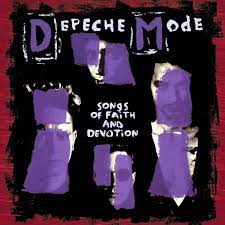
From worldgothday.com / © BatBoy Slim
Today, May 22nd, is among other things International Day for Biological Diversity, Buy a Musical Instrument Day, National Vanilla Pudding Day and, due to it being Sir Arthur Conan Doyle’s birthday, Sherlock Holmes Day. However, what piques my interest in May 22nd is the fact that it’s also World Goth Day. Yes, it’s that date in the calendar when we celebrate Goth, the world’s most black-clad, most kohl-eyeliner-rimmed, most sunlight-adverse musical sub-culture. Today even has its own Goth-themed logo, designed by the fabulously-named BatBoy Slim.
To mark the occasion, here are links to a dozen of my favourite Goth tunes on YouTube. My apologies if, first, you have to sit through a few of those annoying and asinine adverts that nowadays seem to clog the channel like fatbergs in a London sewer. .
To start with, here’s one of the genre’s most old-school bands, Fields of the Nephilim, with their 1987 anthem Moonchild – I’m sure it’s no coincidence that Moonchild is also the name of a novel that occult icon and self-styled ‘wickedest man in the world’ Aleister Crowley had penned 70 years earlier. With the sepulchral voice of singer Carl McCoy and the band’s peculiar look – moth-eaten Wild West gunslingers covered in flour – I thought Fields of the Nephilim were a bit of joke during their 1980s heyday, but I have to say they’ve grown on me since then and I find Moonchild and its lyrical refrain (“Moonchild, lower me down, lower me down / Moonchild…. Lower me down, down, down, down, down, dowww-wwwn!”) irresistible.
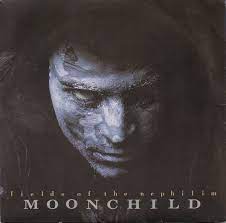
© Situation Two
Also defiantly old-school in sound, but of a more recent vintage – it was originally released in 2006 – is Tear You Apart by Californian band She Wants Revenge. Like many people, I hadn’t heard the song before it was used in a 2015 episode of the TV show American Horror Story (apparently at the insistence of Lady Gaga, who featured among the cast). When I did hear it, with its cheeky emulation of the dub-style guitar sound from Bauhaus’s 1982 epic Bela Lugosi’s Dead, and its titular homage to Love Will Tear Us Apart (1980) by Joy Division, I genuinely believed for a moment this was a 35-year-old Goth classic that’d somehow eluded me since the 1980s.
Another band hailing from California is London After Midnight, who no doubt took their name from the long-lost 1927 silent vampire film London After Midnight, which starred Lon Chaney Sr. In a genre where too often songs lapse into pompous, overblown melodrama, their 1992 song Sacrifice manages the difficult trick of being stately and melodramatic – check out that thunder in the background – while being rather sweet and jaunty as well.
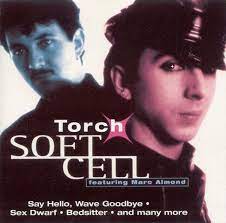
© Rotation
Now for a classic from the early 1980s and the nascent years of Goth music: 1982’s Torch by Soft Cell. The Soft Cell duo of Marc Almond and Dave Ball would probably hate to see themselves categorised as ‘Goth’ and have one of their songs included in a playlist like this, but their sound – and especially the gorgeous trumpet-synth sound featured here – has always, for me, evoked the scene’s candlelit melancholia. Incidentally, when the pair of them were interviewed in the Guardian earlier this month, Almond made a memorable observation about how old age suddenly sneaks up on you: “One day you’re smearing your naked body in cat food at art college, the next you’re choosing terracotta pots at the garden centre.” Yes, Marc, I wholly agree. Not that I ever smeared my naked body in cat food at art college, though.
And here’s another synth-orientated duo. In 2011 Light Asylum consisted of Brooklyn singer Shannon Funchess and keyboardist Bruno Coviello – the latter departed shortly afterwards – and I found this clip of them on YouTube performing their song Dark Allies live at the time. Funchess’s barnstorming vocal performance is amazing. It’s just a pity that the audience seem as animated and appreciative as an army of arthritic zombies.
Still keeping with synth-y musical outfits… Despite the death of founding member Andy Fletcher in 2022, the veteran Basildon band Depeche Mode have a new album, Momento Mori, out this year and, like Jason Voorhees in the Friday the 13th movies, seem unkillable. I’m partial to this remix – the ‘Headcleanr Rock Mix’ – of their song Nothing from the 1987 album Music for the Masses. The Rock Mix takes out much of the original’s synth sound and replaces it with one that’s, well, rocky. It also plays up the song’s ‘Woo-woo!’ backing vocals and the result is like an up-tempo version of the Rolling Stones’ Sympathy for the Devil (1968).

© Mute
Goth icon Nick Cave received some flak this month for being part of the Australian delegation that attended the coronation ceremony of King Charles III. When challenged about this on his website The Red Hand Files, Nick declared an admiration for the House of Windsor, stating that the late Queen Elizabeth II “seemed almost extra-terrestrial and was the most charming woman I have ever met.” This from someone who once duetted with P.J. Harvey? Wow! Nick must have found Queen Liz powerful stuff indeed. He also answered the question, “What would the young Nick Cave have thought of that?” by saying: “…well, the young Nick Cave was, in all due respect to the young Nick Cave, young, and like many young people, mostly demented, so I’m a little cautious about using him as a benchmark for what I should or should not do.”
In fact, I wouldn’t have minded Cave attending the coronation if he’d brought his band the Bad Seeds along with him and they’d been allowed to perform my all-time favourite Nick Cave and the Bad Seeds number Stagger Lee, which is the next song on my list. (In the Stagger Lee video, Nick looks scary even while wearing a pink T-shirt.) Yes, the coronation would have been a much livelier affair if, instead of Handel’s Zadok the Priest, Westminster Abbey had resounded to Nick Cave hollering about slobbering on someone’s head and climbing over pussies to get to ‘one fat boy’s asshole’. And having Blixa Bargeld shrieking animalistically at the moment that Charles got crowned would have worked perfectly.
There was never much chance of Robert Smith, frontman and mainstay of the Cure, getting invited to the coronation. Not as he once said of the Royal Family, “I’m much better than them. They’ve never done anything. They’re f**king idiots.” Anyway, here’s footage of the glorious Mr Smith performing, not with the Cure, but as a collaborator with the Canadian band Crystal Castles in 2010. They’re doing a cover of the song Not in Love, originally recorded by another Canadian outfit, Platinum Blonde, in 1983.
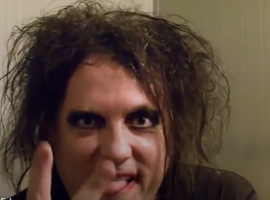
From indy100.com
I don’t know why I like this cover of the 1968 Yardbirds number Heart Full of Soul by the Goth band Ghost Dance – who were formed in 1985 by Gary Marx (late of the Sisters of Mercy) and Anne-Marie Hurst (late of Skeletal Family), and who disbanded in 1989, but who have recently reformed again. I just do. It’s a joyous-sounding thing.
Not normally joyous is the sound of Goth / industrial-rock juggernaut Killing Joke, whose mission according to singer and keyboardist Jaz Coleman was to “define the exquisite beauty of the atomic age in terms of style, sound and form”. Actually, the band’s crunching, thunderous urgency rarely sounded ‘exquisite’ or ‘beautiful’, but it was pretty impressive. Here’s a track I like very much from their eponymous 2003 album. It’s called Asteroid and features Coleman screeching the blunt but memorable refrain, “Asteroid…! Coming in from the void!” The hectic drums are courtesy of a guest artist, Nirvana and the Foo Fighters’ Dave Grohl. Killing Joke had once accused Nirvana of plagiarism because of the similarity of the guitar riff in Nirvana’s Come as You Are (1991) to the one in their 1985 song Eighties, so clearly there were no hard feelings between them and Grohl.

© Zuma / Epic / Columbia
Idiosyncratic Birkenhead indie-rock troubadours Half Man Half Biscuit could in no way be described as ‘Goth’, but their 2000 song With Goth on our Side not only takes the mickey out of a certain Bob Dylan effort, but also pokes affectionate fun at music’s darkest subculture with its tale of Dai Young, who’s ‘the king of Welsh Goths’, and his girlfriend: “She sits and she crimps / Her mother’s convinced / She’s communing with imps.” The girlfriend also has a kid brother called Wilf, who’s all right because ‘he’s into Placebo and Cradle of Filth’.
And to call the curtain on World Goth Day 2023, here’s Cities in Dust by Siouxsie and the Banshees, the stand-out track on their 1986 album Tinderbox – which, incidentally, was the first album by the band that I ever bought. Needless to say, I hold Siouxsie Sioux in high regard. Indeed, if Nick Cave believes Queen Elizabeth II is the most extra-terrestrial and most charismatic woman he’s ever met, well, I can only surmise that he’s never met Her Gothic Highness, the majestic and imperious Siouxsie.
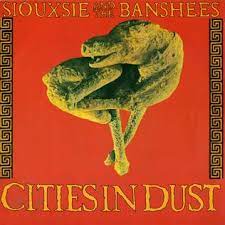
© Polydor / Geffen


